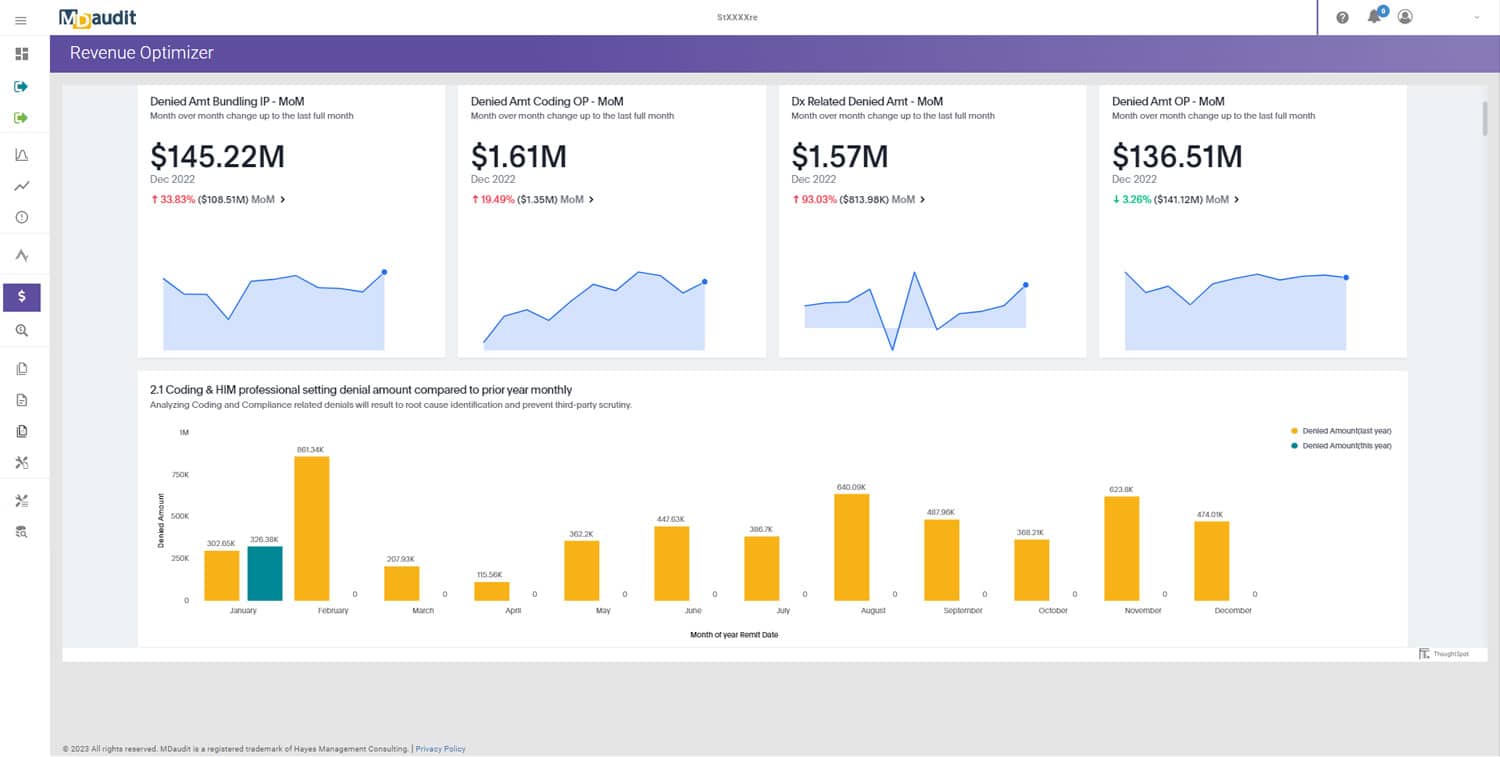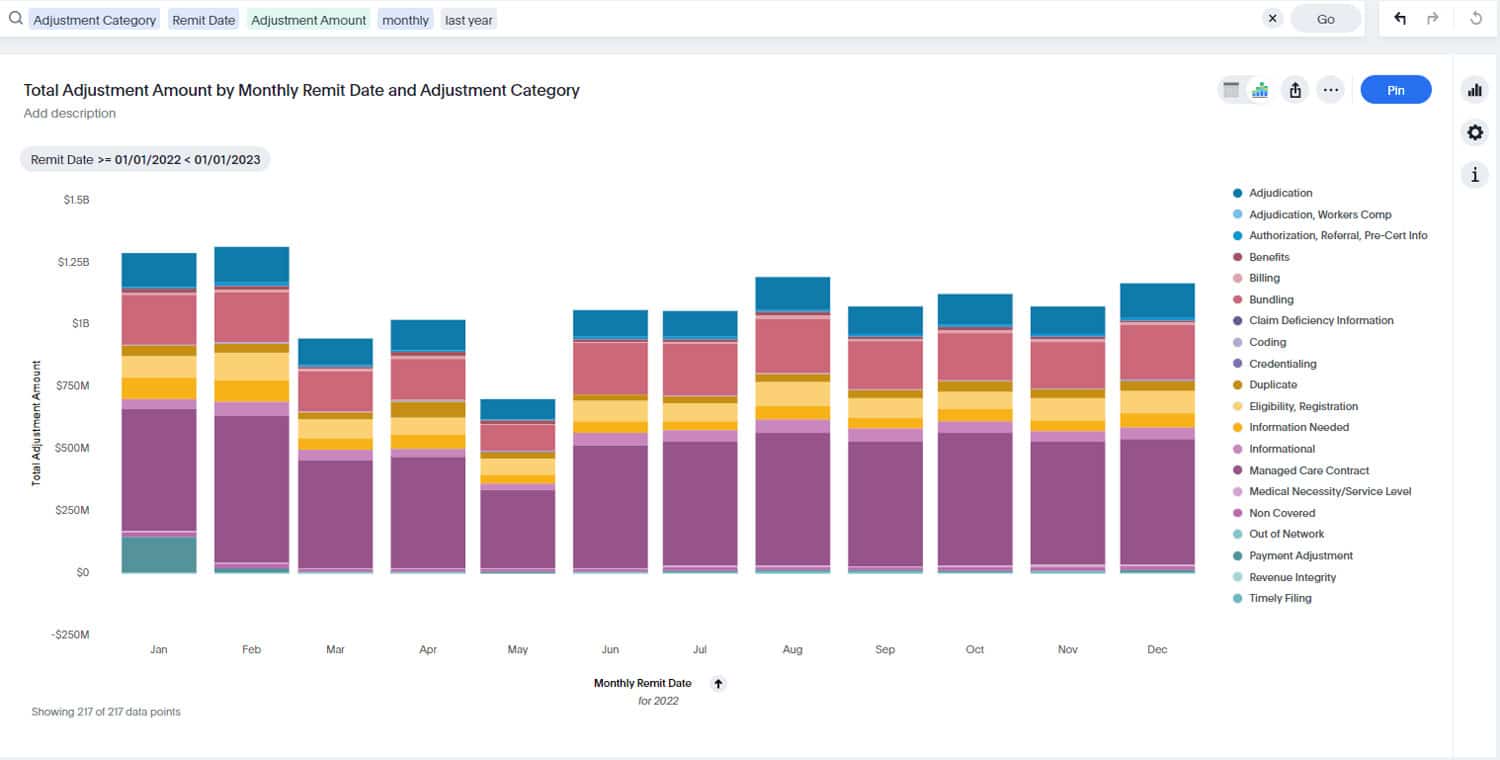Coding accurately and fully captures the physician visit, tests or procedures, medical equipment, and all else that occurred during the patient’s visit. Any inaccuracies that sneak into the process and result in undercoding or overcoding present significant risks to the bottom line, as profitability is a core concern for health systems.
While only the provider pays particular attention to undercoding, the impacts and risks of overcoding are considerable — and growing among payers and federal authorities. Medicare program integrity activities to root out overpayments resulting from inaccurate coding return $8 for every $1 spent, and the federal government has committed more funds in 2023 to continue these activities.
Intentional or accidental overcoding can bring significant fines, in addition to having to repay the amount of the original overcoded claim. The unwanted publicity can also cause reputational damage that’s difficult to repair. Unbundling is a particular problem, submitting separate codes for multiple procedures that should actually be billed as a single charge.
“Compliance programs are keen on proactively finding overcoding risks and educating providers,” says Ritesh Ramesh, COO, MDaudit. “At a time when revenue and profitability are critical for the survival of medical providers and hospitals, providers should not take their eyes off the ball on overcoding.”
Federal Payers Get Serious About Accurate Coding
Together, the Centers for Medicare and Medicaid Services (CMS), the Department of Justice (DOJ), and the Department of Health and Human Services (HHS) Office of Inspector General (OIG) are investing in predictive modeling and artificial intelligence tools to scrutinize claims more closely before adjudication, to reduce improper payments without adding administrative burden. At the same time, retrospective audits can claw back revenue from current and past years, putting financial pressure on providers that have long used those funds for continuing operations.
According to the MDaudit Annual Benchmark Report, 82% of all claim denials are associated with Medicare, so providers must focus their efforts in this area — even as federal auditing efforts continue to proliferate. On the commercial side, Medicaid managed care plans are under constant scrutiny as OIG and CMS have ongoing concerns about efforts to combat fraud, including concerns about a lack of fraud referrals.
The FY 2023 HHS budget provides $2.5 billion in total mandatory and discretionary investments for the Healthcare Fraud and Abuse Control (HCFAC) and Medicaid Integrity Programs. The budgeted $899 million in discretionary HCFAC funding is more than $26 million above the FY 2022 enacted level.
According to a recent NPR article, 90 audits of Medicare Advantage (MA) plans from the years 2011-2013 found an average yearly overbill of more than $1,000 per patient. Extrapolated across populations, that represents $650 million in excess payments. Further, a New York Times analysis finds that eight of the largest MA insurers, representing more than two-thirds of the market, have submitted inflated bills to the government. Additionally, four of the five largest providers have been accused of fraudulently upcoding by the government.
If you don’t think the federal government is serious about overcoding, think again.
Pay Close Attention to Overcoding Problem Areas
Overcoding remains an issue across the healthcare landscape. At the office-visit level, compliance teams should pay attention to evaluation and management (E&M) coding, as it drives reimbursement. In hospital billing, bundling is a major driver of compliance issues, followed by billing and coding errors. In 2022, overcoded charges reclaimed 21% of the revenue recovered from undercoded claims.
Compliance teams should be efficient in managing external payer requests to retain at-risk revenues, with close attention paid to the below areas for overcoding, medical necessity, clinical documentation, and bundling-related issues. Getting paid on time for these often-expensive services can significantly impact an organization’s profitability and financial health. Pay particular attention to these focus areas:
Outpatient Billing
- Surgeries that involve multiple services performed by the same surgeon must be billed together and cannot be separately billed by different physicians
- Surgeries: orthopedic, spine, neurosurgery
- Specialty drugs and clinical justification for units administered for treatment
- Hospital observation care services
- Implants/medical devices
- Laboratory: chemistry, general classification, hematology, immunology, bacterial
Inpatient Billing
- Short stay inpatient
- Rehabilitation facilities
- DRGs that drive higher healthcare costs
- Sepsis
- Cardiology
- Digestive system
- Kidney
Compliance teams should have a consistent playbook for auditing these claims, appealing denials to payers, and educating providers on mistakes.
Tips for Better Coder Compliance
With the rise of federal audits and the possibility of maximizing revenues, organizations must do a better job of coding correctly the first time. Providers can run afoul of federal statutes even in undercoding situations, which is why coding staff should keep current on coding and compliance rules.
Undercoding claims is not the answer to overcoding to avoid an audit or potential federal penalties. Undercoding deprives organizations of critical revenue during a time when expenses are rising faster than revenues. The key is to accurately capture all aspects of a patient visit, a test, or a procedure. Nothing more, and nothing less.
Coding changes occur frequently, so it can be difficult for everyone to keep up. Assign someone the task of updating internal coding manuals on a frequent basis, sending out specific updates and links when warranted. Reviewing updates can become a central facet of an ongoing educational program for coders. Finally, schedule coder audits more frequently to ensure compliance to coding procedures and policies while reducing errors that can delay revenue.
In short,
- Consistently stay abreast of all coding and compliance rules.
- Avoiding overcoding doesn’t mean you should undercode to try and avoid an audit, as this is a big revenue killer in and of itself.
- Because of these: False Claims Act, the Criminal Health Care Fraud statute, or the Anti-kickback statute, healthcare systems can be found guilty of making money through fraudulent means, despite it being less money by undercoding.
- Schedule coder audits more frequently.
- Develop an educational program for coders to stay on track and aware of changes.
- As changes occur, update your coding manual by appointing someone this specific task.
Coding Compliance Starts with the Right Software
Healthcare providers need innovative and robust auditing workflows to ensure claims are accurate and reflect the particulars of the patient encounter. The risks for undercoding include missing out on vital revenue to which the provider or facility is entitled. Overcoding is an even bigger problem, putting organizations at risk for audits that can stretch back years and jeopardize significant revenue, not to mention reputational risk and patient loyalty.
Organizations need a single-platform approach to coding workflows that can eliminate manual processes and streamline tasks such as auditing, rebuttal, follow-up audits, and reporting. Workflows should include risk-based and retrospective audits for professional, inpatient, and outpatient charges, as well as the ability to identify new coders who may need additional guidance. The platform should enable dialog between coders and auditors while providing full visibility into coder workloads and auditing tasks.
For patients who pay out-of-pocket, overcoding will drive them toward provider organizations that bill and code properly as they seek to shop for affordable options. Improving billing and coding practices can enhance the patient experience and increase revenue through greater patient loyalty and referrals. And that’s “just right” for everyone involved.
To get an even deeper perspective on coding and managing denials, check out our panel discussion Optimizing Coding and Denials Processes for Revenue Cycle Management.






